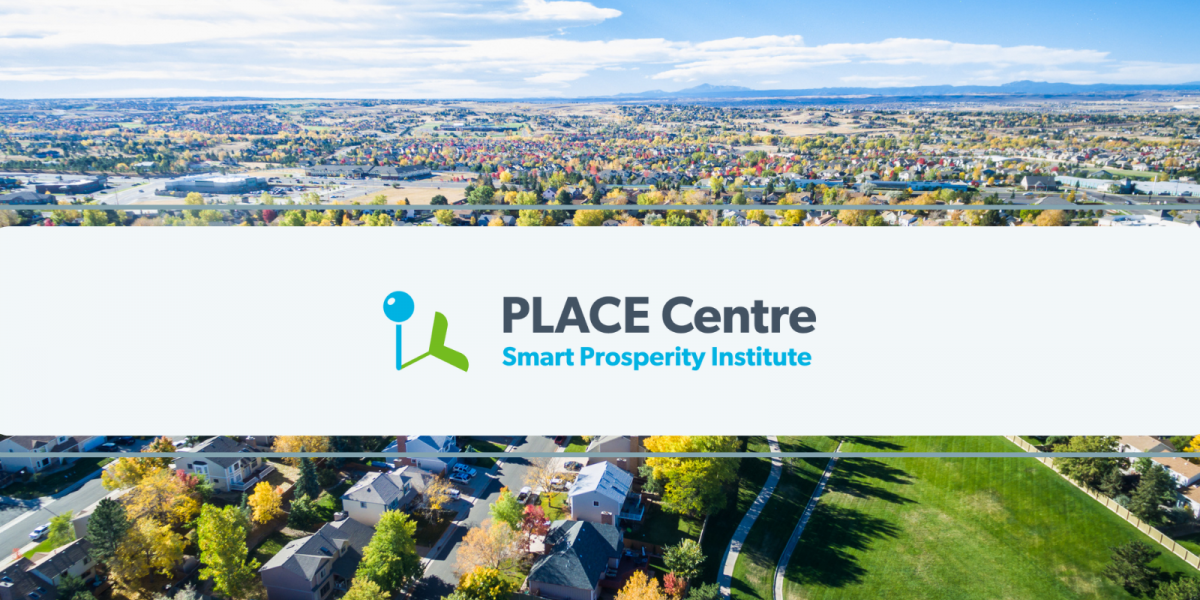
November 24, 2022
By John McNally, Program Director for Clean & Resilient Growth at the PLACE Centre
Imagine a prosperous zero-emissions economic future for communities across Canada. A future where communities live well; where children can safely play in shaded areas and go to school close to their homes; where seniors can easily get to their doctor, the grocery store, and the bank through accessible public transit; and young people can obtain jobs, afford a home, and start a family.
Today, to support this vision, Smart Prosperity Institute is launching the PLACE Centre. The PLACE Centre, which stands for Propelling Locally Accelerated Clean Economies, is a policy research initiative focused on the complex challenges limiting clean economic growth in Canadian communities. Our core approach is “place-based,” meaning the PLACE team works with all levels of government, industry, and civil society organizations to ensure communities across Canada have the solutions needed to overcome the challenges they face in advancing clean economic growth. With this approach, the PLACE team can create practical, place-based recommendations where everyone involved can collaborate and work towards making progress in solving these problems. That way, every region and community across the country can attract investment, create jobs, and lower the cost of living – improving quality of life for everyone while creating a lower emissions world.
In communities across Canada, new technologies and ideas are creating positive change where homes become more affordable, getting from place to place becomes safer and more accessible, and the costs of living are lower – leading to a better quality of life for everyone. These changes are visible across the country. For some, it is about creating jobs and investing in industries of the future. Industries like battery and zero-emissions vehicle manufacturing are creating high-quality jobs that turn into careers in Windsor, Ontario, and Mirabel, Quebec. Industries making food products from lentils, pea proteins, and soybeans are attracting investment to Portage La Prairie, Manitoba.
For others, this vision is about making their communities better places to live. The Town of Bridgewater, Nova Scotia, is lowering its household energy costs. Iqaluit and Cambridge Bay, Nunavut, are bringing more spaces of play and creativity to their citizens. Guelph, Ontario, is creating a regionally-focused circular food system so that food is affordable and accessible for its community members. These regions’ initiatives are helping advance national growth, adapting to a changing climate and reducing emissions, and improving the well-being of their citizens.
It may be challenging to see this vision as more than just a dream for your community. From affordable housing to satisfactory health care to growing the economy to addressing climate change, there are many big challenges that are concerning Canadians. Even in addressing these issues, Canadian communities face questions: How can a community grow its economy amidst a rising cost of living? How can we tackle shortages of skilled workers, as the workforce ages and we become more inclusive for everyone? How will regions in Canada achieve these objectives while also reducing their own greenhouse gas emissions, adapting to a changing climate, preserving nature and biodiversity, and reducing pollution?
These questions make it challenging for Canadians to feel confident in a future where these issues are sufficiently addressed within their own communities and where their livelihoods are thriving. Yet all Canadians can have the issues that matter most to them sufficiently addressed, and all communities across Canada can advance this vision of a thriving future. Regions across the country are well situated to identify the challenges they are facing and to know what solutions are needed. In crafting these solutions, communities can leverage their strengths, navigate the realities of their situation, and meet their residents’ needs, all while establishing local economic growth and creating more livable communities.
As the PLACE Centre launches, it will focus on two complex challenges that will shape the future of our communities:
1) How can every community across the country create jobs and economic prosperity as the world moves to reduce its greenhouse gas emissions, and Canada adapts to a changing climate?
2) How can we create accessible communities that meet the needs of everyone from ages nine to ninety; are affordable for everyone to have a home, heat that home, and put food on the table; and will help Canada meet its climate goals of zero emissions by 2050?
Answering both of these questions is essential for Canada to succeed in the clean economy. As our work advances, the PLACE Centre will take on new challenges that our place-based perspective is well equipped to solve; where complex, intertwined challenges require actions from more than one individual, government, or stakeholder if communities want to advance opportunities for clean regional economic development. This vision for change is well aligned with the shared vision of Smart Prosperity Institute and the Natural Step Canada to support a strong and inclusive economy for Canada that thrives within nature’s limits.
We do not believe that some issues, which are global or national in scope, can be completely resolved through this place-based lens. However, a place-based perspective can help develop better solutions for communities to manage impacts and risks. It also can help develop workarounds for limitations or challenges the community may encounter. Ultimately, the goal of place-based policy is to think beyond a one-size-fits-all approach to driving action. If complex, intertwined problems stand in the way of that, a place-based lens can contribute to lowering that barrier.
The PLACE Centre team is looking forward to working with all levels of government, industry, and civil society to thoroughly understand the problems restricting clean economic growth within a given region and create practical, place-based recommendations where everyone involved can collaborate and work towards making progress.